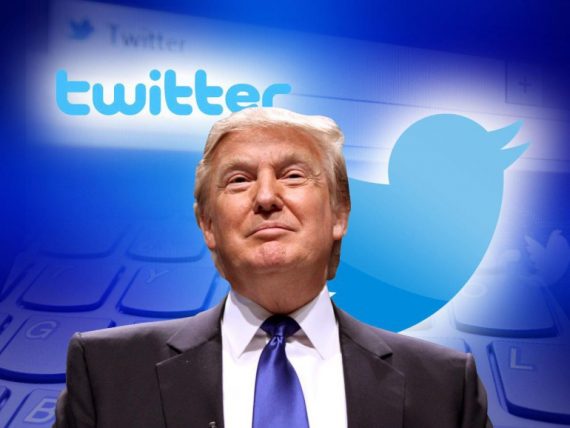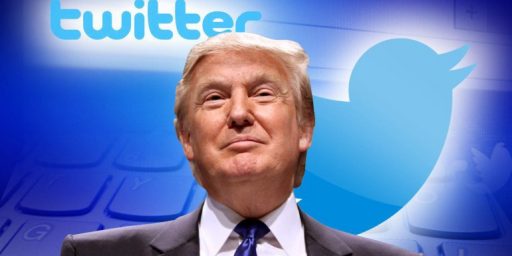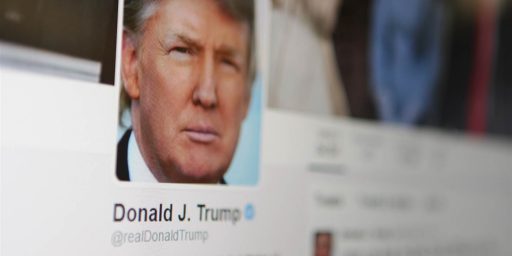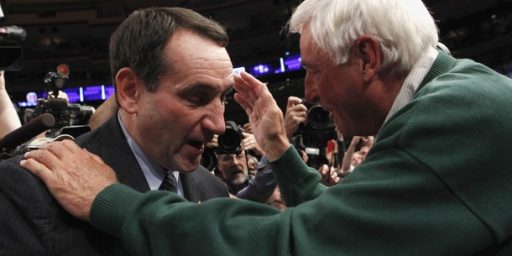Blocked Twitter Users Sue President Trump Alleging First Amendment Violation
Twitter users who have been blocked on the service by President Trump are suing him, claiming that their First Amendment rights have been violated.
A group of Twitter users who have been blocked by President Trump on Twitter have filed a lawsuit alleging that their First Amendment rights have been infringed by the President’s action and seeking a court order that they be unblocked so that they can see what the President sends out from his account and respond to him in manner that he could see:
WASHINGTON — A group of Twitter users blocked by President Trump sued him and two top White House aides on Tuesday, arguing that his account amounts to a public forum that he, as a government official, cannot bar people from.
The blocked Twitter users, represented by the Knight First Amendment Institute at Columbia University, raised cutting-edge issues about how the Constitution applies to the social media era. They say Mr. Trump cannot bar people from engaging with his account because they expressed opinions he did not like, such as mocking or criticizing him.
“The @realDonaldTrump account is a kind of digital town hall in which the president and his aides use the tweet function to communicate news and information to the public, and members of the public use the reply function to respond to the president and his aides and exchange views with one another,” the lawsuit said.
By blocking people from reading his tweets, or from viewing and replying to message chains based on them, Mr. Trump is violating their First Amendment rights because they expressed views he did not like, the lawsuit argued.
It offered several theories to back that notion. They included arguments that Mr. Trump was imposing an unconstitutional restriction on the plaintiffs’ ability to participate in a designated public forum, get access to statements the government had otherwise made available to the public and petition the government for “redress of grievances.”
Filed in Federal District Court for the Southern District of New York, the lawsuit also names Sean Spicer, the White House press secretary, and Dan Scavino, Mr. Trump’s director of social media, as defendants. It seeks a declaration that Mr. Trump’s blocking of the plaintiffs was unconstitutional, an injunction requiring him to unblock them and prohibiting him from blocking others for the views they express, and legal fees.
The Knight First Amendment Institute, directed by Jameel Jaffer, also joined the lawsuit as a plaintiff although its Twitter account had not been blocked by Mr. Trump. It argued that it had a First Amendment right to hear from people who had been blocked and are barred from participating in the “forum” of message chains based on his postings.
The lawsuit was foreshadowed last month by a letter the Knight First Amendment Institute sent to Mr. Trump on behalf of two of the now-plaintiffs asking him to unblock their accounts, but the White House did not do so.
News of the letter, and the novel legal arguments it advanced, touched off a debate among legal specialists, with some supporting the idea and others expressing skepticism. The skeptics argued, among other things, that Mr. Trump’s account was personal, not official; that he had the same right to block people he considered trolls as anyone else; and that the injury to blocked people was minor since they could still view his postings as long as they did not log in to Twitter under their own accounts.
The Knight First Amendment Institute sought to address and rebut such critiques in a lengthy blog posting later last month, and its complaint noted that since its letter, the Trump White House has taken several steps suggesting that the administration considers his Twitter account to be an official channel.
For example, Mr. Trump announced his nomination of Christopher A. Wray as F.B.I. director on Twitter, and the White House sent a letter to the Senate Intelligence Committee pointing to Mr. Trump’s denial on Twitter that he had taped his conversations with the former F.B.I. director, James B. Comey, as an answer to the panel’s questions about that matter.
“My use of social media is not Presidential — it’s MODERN DAY PRESIDENTIAL,” Mr. Trump tweeted on July 1.
Also since the early June letter, the Supreme Court unanimously ruled that a North Carolina law barring convicted sex offenders from using Twitter or Facebook violated the First Amendment.
Justice Anthony M. Kennedy, writing for a five-justice majority, said the law violated the First Amendment because social media had become “the modern public square.” Justice Samuel A. Alito Jr., joined by two other justices, concurred with the result but expressed reservations that Justice Kennedy’s language was too sweeping and loose.
I previously wrote about this issue last month when the Knight Foundation sent a letter on behalf of its clients to President Trump and others at the White House alleging that their client’s First Amendment rights had been violated because the President had blocked them on his personal Twitter account. At the time, I expressed skepticism about the viability of the claim that being blocked on Twitter by a sitting President was a violation of the First Amendment for several reasons. For one thing, notwithstanding the fact that Trump himself is President of the United States, Twitter itself is a private entity, not a government forum and, as a Twitter user, Trump should arguably have as much right to make use of the methods that the service makes available to prevent trolls and other persons from showing up in one’s timeline. Blocking someone, or muting them (which prevents a user from showing up in one’s mentions column on whatever device a person uses to access the service) does nothing to prevent them from stating their opinions on Twitter, nor does it prevent others from seeing what they tweet. Additionally, as I explained in my post, there are numerous ways for a user to get around being blocked by an individual user to see what they are tweeting. One method would be to create a separate account on the service, which can be done for free rather easily. Another method is to follow an account such as @RealPressSecBot which restyles all of the tweets from Trump’s tweets in the form of White House Press Releases, a nod to the comment that Sean Spicer made last month that the President’s tweets constitute a statement of official White House policy. Arguing that Trump has violated someone’s First Amendment rights by blocking or muting them on Twitter is, it seems to me, akin to arguing that he is obligated to accept the friend request of every American citizen on Facebook or make his private cell phone number available to the general public. Such an argument, of course, would not get very far in a court of law largely because the First Amendment doesn’t mean that someone has a right to be heard by a specific person, but rather that they have a right to speak freely without fear of punishing. Blocking or muting a Twitter account does nothing to infringe on that right.
As I noted in my previous post, there are several legal analysts who I will admit are far smarter than I who have expressed different opinions on the potential claims that the Plaintiffs are making in this case. This includes people on the right such as Eugene Volokh, who examined the legal issues raised by the Knight Foundation’s letter in a detailed post last month and expressed the opinion that there might be an argument under the First Amendment if a Court were to find that Trump was acting in his Presidential role in blocking the accounts rather than as a private individual. Lawfare’s Robert Loeb, meanwhile, posted his own analysis around the same time and came to the conclusion that there is a clear First Amendment violation in the President’s action. On the other hand, Harvard Law Professor Noah Feldman largely dismissed the claims in an article for Bloomberg News. In any case, the matter is now before a Court and Trump’s lawyers will no doubt respond with motions seeking to have the case dismissed swiftly. How the District Court rules on those motions will go a long way toward deciding if this is a case that has legal merit, or if it will die a quick and largely forgettable death.
Here’s the Complaint:
Knight First Amendment Institute Et Al v. Trump Et Al by Doug Mataconis on Scribd






I’m no lawyer…
But it seems to me that this is another case where Snowflakes bravado is going to hurt him.
He himself has described his twitter feed as official communications.
Ipso facto…it’s not private communications.
Does the Constitution assure the right to troll Dumb-Don?
It’s in Article XII!
@Mister Bluster:
Well played, sir!!!
This is interesting. Normally I would say this is a frivolous suit as Twitter is a private company but Trump has made a point of using it for semi-official WH communications. As such, it can be considered an legit legal means of contacting a government official through a third-party channel and should be treated as such. Blocking someone could then be held to be analogous to directing FedEX or private couriers to not deliver packages from a specific sender or address.
By making it his way of bypassing the system to reach the people, he has in effect made it part of the system to speak with the President. While I don’t think it’s a 1st Amend violation per se, I do want to see the Court clarify on the official status of the Twitter feed as legal documentation and communications and whether it counts as speak ex Cathedra. Perhaps force him to use the official POTUS account if he wants to Tweet so we can all be sure when he’s Donald and when he’s POTUS?
A couple of thoughts.
Does Twitter, as the private party to this argument, have a say in this matter?
Has Twitter, because of the official actions and declarations of the President and because of the reaction of recipients, become, in effect, a public utility?
Can, or will, Twitter defend its right to shut off the President’s account?
I really don’t have an opinion in the matter but it is an interesting legal issue. My first thought was to see this as the equivalent of the White House to use caller ID to block calls to its public number. I’m sure there are a lot of analogous scenarios to chew over.
@KM:
According to the WH they are “official statements”.
OT…
I see that President Drain-the-Swamp is naming another Goldman Sachs guy to chair the Fed.
Remember when Snowflake tied Clinton to Goldman Sachs and said:
Remember when Snowflake tweeted:
Good times…